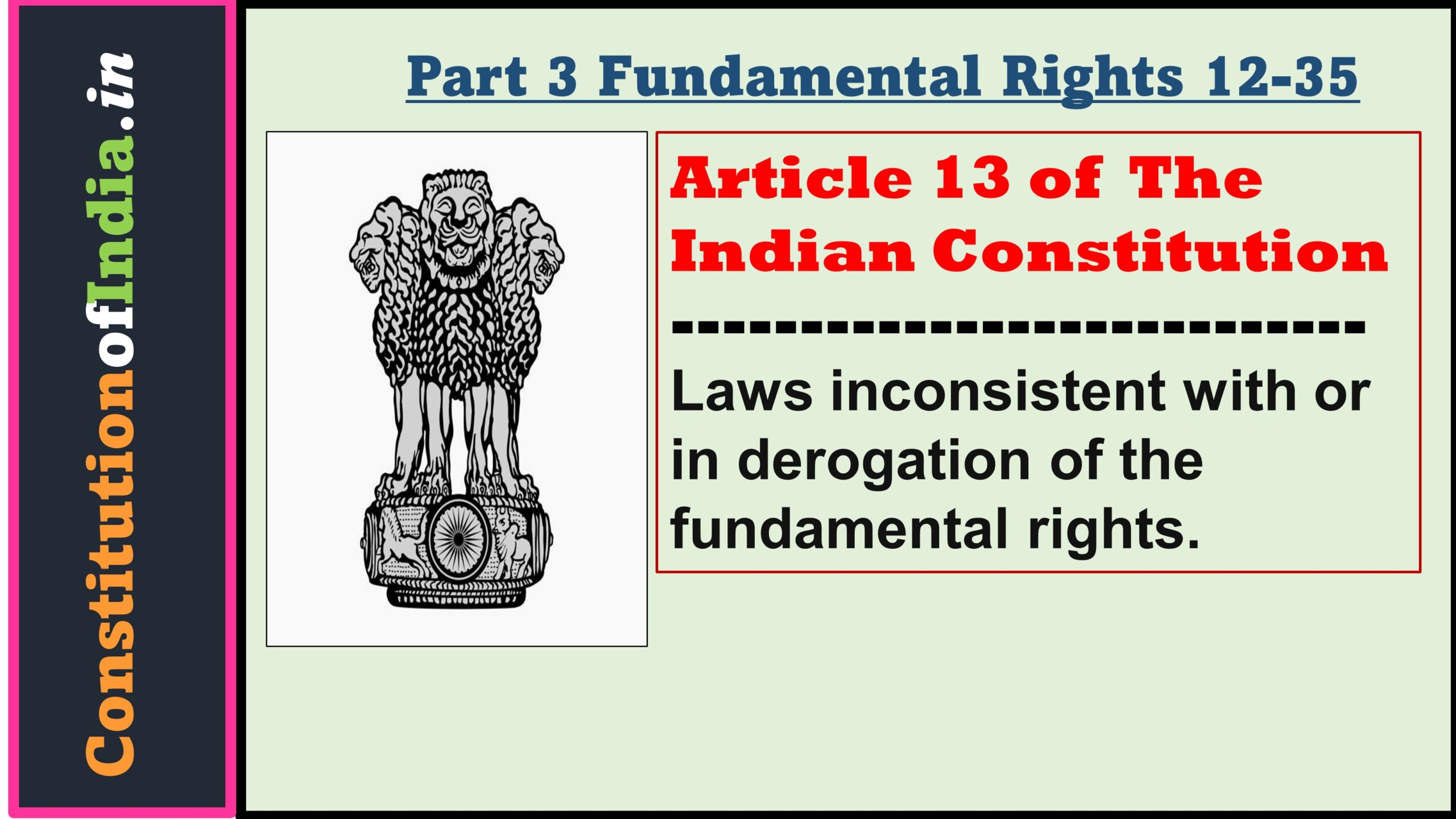Article 13 of Indian Constitution: Laws inconsistent with or in derogation of the fundamental rights.

Article 13 Laws inconsistent with or in derogation of the fundamental rights – Constitution Of India
- All laws in force in the territory of India immediately before the commencement of this Constitution, in so far as they are inconsistent with the provisions of this Part, shall, to the extent of such inconsistency, be void.
- The State shall not make any law which takes away or abridges the rights conferred by this Part and any law made in contravention of this clause shall, to the extent of the contravention, be void.
- In this article, unless the context otherwise requires,—
- “law” includes any Ordinance, order, bye-law, rule, regulation, notification, custom or usage having in the territory of India the force of law;
- “laws in force” includes laws passed or made by a Legislature or other competent authority in the territory of India before the commencement of this Constitution and not previously repealed, notwithstanding that any such law or any part thereof may not be then in operation either at all or in particular areas.
- Nothing in this article shall apply to any amendment of this Constitution made under article 368.]
Summary of Article 13 of Indian Constitution

Explanation using Example
Under the Indian Constitution, if a law demands social media platforms to seek government clearance for politically sensitive posts, it could infringe upon Article 19(1)(a) protecting free speech. Article 13 enables courts to annul such laws contradicting fundamental rights. Recent judicial interventions have upheld this principle, ensuring citizens’ freedom of expression remains intact. These rulings exemplify Article 13’s role in safeguarding constitutional liberties, particularly in the digital age where online discourse plays a crucial role in public discourse.
FAQ on Article 13 of Indian Constitution
What is the significance of Article 13 in the Constitution of India?
Article 13 in the Indian Constitution is of significant importance as it deals with the protection of fundamental rights. It establishes that any law, be it pre-existing or newly enacted, must be in conformity with the fundamental rights enshrined in the Constitution. This article acts as a safeguard to ensure that fundamental rights are not violated or abridged by any legislation.
How does Article 13 of the Indian Constitution address the issue of inconsistency between existing laws and fundamental rights?
Article 13 addresses the issue of inconsistency by declaring that any law that is inconsistent with the fundamental rights, as described in Part III of the Constitution, is void to the extent of the inconsistency. This means that if a law contradicts or infringes upon any fundamental right, it will not be legally valid to that extent.
What types of legal documents and regulations are encompassed by the term “law” in Article 13?
The term “law” in Article 13 is inclusive and covers a wide range of legal instruments, including ordinances, orders, bye-laws, rules, regulations, notifications, customs, or usages that have the force of law in the territory of India. This broad definition ensures that all forms of legal prescriptions are subject to the provisions of Article 13.
Can you explain the concept of “laws in force” as mentioned in Article 13?
“Laws in force” refers to any laws that were passed or made by a legislative body or competent authority in the territory of India before the commencement of the Constitution and were not previously repealed. Even if these laws are not in operation at the time, they are still considered to be “laws in force” and must comply with the fundamental rights guaranteed by the Constitution.
Does Article 13 have any exceptions or limitations, and if so, what are they?
Article 13 does not apply to amendments made to the Constitution under Article 368. This means that when the Constitution itself is amended through the prescribed constitutional amendment process, the provisions of Article 13 do not hinder or nullify such amendments. However, this exception only applies to amendments made under Article 368 and not to other legislative actions or laws.